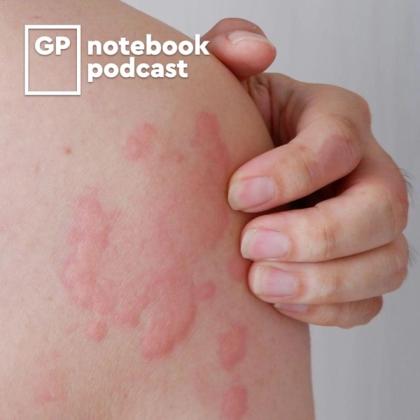Chronic spontaneous urticaria (CSU) is a common problem, often affecting younger people. It refers to chronic urticaria that has no obvious cause or trigger and which causes weals to occur on the skin most days for 6 weeks or more. It can be a deeply distressing and frustrating condition for sufferers that can greatly affect their quality of life. In this episode, Dr Roger Henderson looks at the possible triggers of CSU, how to approach the treatment of people with the condition and what drug therapies may be helpful.
Key references
- Allergy UK. 2022. What is chronic spontaneous urticaria?
- Sabroe RA, et al. Br J Dermatol. 2022;186(3):398-413. doi: 10.1111/bjd.20892.
- Zuberbier T, et al. Allergy. 2022;77(3):734-766. doi: 10.1111/all.15090.
- BMJ Best Practice. Urticaria and angio-oedema. 2022.
Key take-home points
- CSU refers to chronic urticaria that has no obvious cause or trigger and causes weals to occur on the skin most days for 6 weeks or more.
- It used to be known as chronic idiopathic urticaria, but this term is no longer used.
- Up to 1% of the UK population is believed to be affected.
- Females are twice as likely to have CSU.
- People aged 20–40 years are most likely to develop symptoms.
- The lifetime prevalence of CSU is 1.8%
- Weals and angioedema are the two main symptoms and can occur together in up to 40% of cases, with weals being the most common symptom.
- Systemic symptoms, such as joint pains, fever, fatigue, palpitations and wheezing, can also occur.
- There is a strong association between CSU and other immune disorders, particularly autoimmune thyroid disease.
- Guidelines recommend limiting blood tests to a blood count and inflammatory markers.
- The aim of treatment is to achieve symptom control although there is no cure currently available.
- Treatment usually starts with second-generation antihistamines, built up to maximal levels including unlicensed doses.
- Specialist referral may often be necessary.
- Specialist treatments can include omalizumab and ciclosporin.
- Short courses of steroids can sometimes be used to treat severe exacerbations.
- CSU has a high rate of remission.
Create an account to add page annotations
Annotations allow you to add information to this page that would be handy to have on hand during a consultation. E.g. a website or number. This information will always show when you visit this page.
